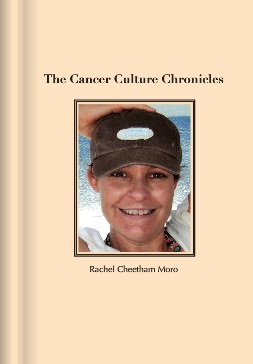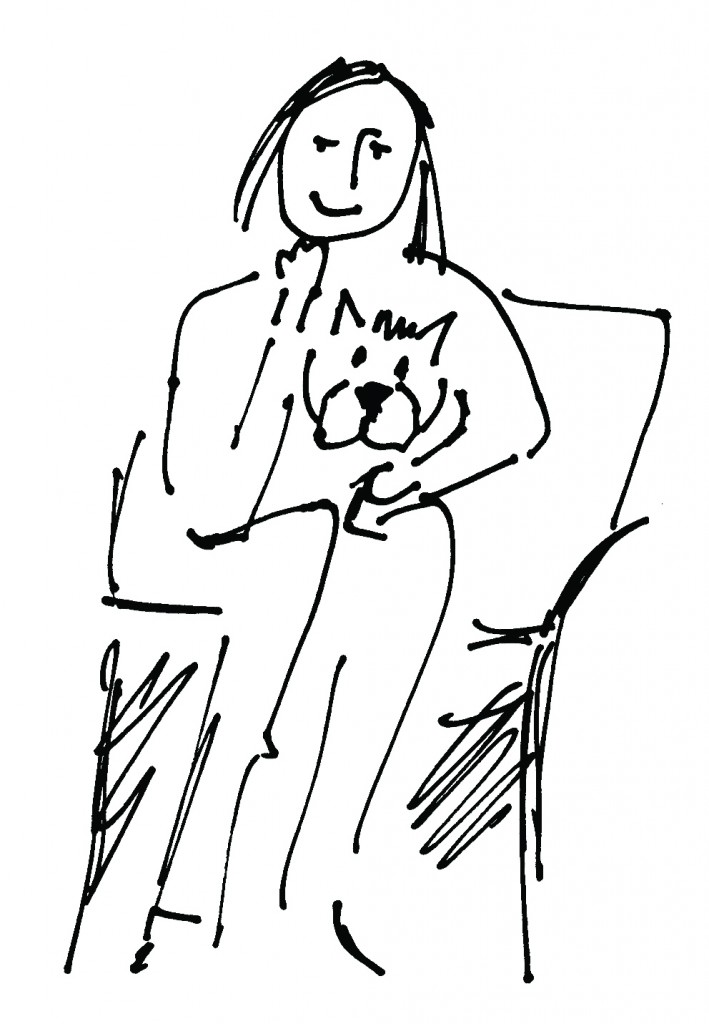 I met Rachel Cheetham Moro through her writing. I found her blog, The Cancer Culture Chronicles, sometime during my own treatment for breast cancer. I became an avid reader of her insightful and often hilarious prose. Recently, Rachel’s writing has been published in book form, compiled and edited by her mother Mandy Cheetham and her friend Sarah Horton. Although I followed Rachel’s blog and still return to it from time to time, reading Rachel’s story in print from start to finish impressed its significance upon me in a new way.
I met Rachel Cheetham Moro through her writing. I found her blog, The Cancer Culture Chronicles, sometime during my own treatment for breast cancer. I became an avid reader of her insightful and often hilarious prose. Recently, Rachel’s writing has been published in book form, compiled and edited by her mother Mandy Cheetham and her friend Sarah Horton. Although I followed Rachel’s blog and still return to it from time to time, reading Rachel’s story in print from start to finish impressed its significance upon me in a new way.
Rachel was diagnosed with breast cancer at 33 years old in 2004. Her blog begins in 2009, the time of her metastatic recurrence. Her early posts document her transition from a “good” cancer patient, concerned about other people’s experiences of her illness, to a righteously angry woman, dying of a disease whose lethality is too often downplayed. In a posted titled, “I’m talking about it whether you like it or not,” Rachel explains her perspective on speaking openly about breast cancer in a bulleted list that includes, “I have breast cancer, and dealing with the day to day practicalities of it means it’s often on my mind,” and, “Having breast cancer really pisses me off.”
Rachel’s voice only gets stronger even as her physical body weakens. She relentlessly reports details of her declining health, sometimes with brutal anguish, just as often with humor. After losing the use of her left hand due to cancer, treatment, or both, Rachel needed to get her vehicle legally equipped with a turning knob and other fittings to accommodate one-handed driving. Finally meeting state requirements for driving with a disability, Rachel gleefully wrote, “Now all I need to work on is being able to flip the bird with my spare gimp hand. A must-have skill for handling the extraordinarily polite New Jersey drivers.” When I read this at the time, I laughed between my tears, relishing the absurd image while sinking at the news of my friend’s decline. Reading it in the context of the fuller story, I see that Rachel shifted her way of putting people at ease with her illness: she went from the cancer patient who stayed positive for others to an irresistibly hilarious one who shared the brutal particulars.
Aside from being a wonderful virtual friend, Rachel was a great social analyst. As Rachel’s posts progress, we see her growing increasingly (and rightfully) roused by the injustice of pink culture:
I too used to secretly look forward to October, when I would drape myself in pride with all manner of garish pink, survivor-emblemed merchandise and take my place in the Survivors circle whilst bopping out to “We Are Family” or whatever the cheesy designated anthem was for that year, at one of the many breast cancer fundraising walks. But I’m not doing it this year or ever again. It’s just a load of bollocks and a great excuse for companies to market their products to the well-meaning consumer in the guise of “Breast Cancer Awareness” when all it really boils down to is profiteering at the expense of real people really suffering and really dying from this insidious disease.
The focus of Rachel’s writing went beyond her personal experiences to the peculiarities of breast cancer culture. She analyzed everything from Pink Ribbon Barbie Dolls to other absurd products marketed under the pink ribbon, some of which received commendation in Rachel’s delightfully sarcastic Pink Boob Awards. Rachel could find layers of meaning in discourses around cancer, minute interactions between doctors and patients, and, using her prodigious skills as a former accountant, she uncovered the true commitments of breast cancer charities such as the National Breast Cancer Foundation, and others. Perhaps most famously Rachel’s rigorous analysis of several years of financial accounts of the Pink Juggernaut, Susan G. Komen for the Cure, showed in detail how the organization’s funding for researching “the cure” has declined over the years even as revenues have rocketed upwards.
Rachel died in February 2012 at 41 years old. Just as she aspired to be, Rachel is an important chronicler of the cancer world. She is an important advocate, as somebody who fell through cracks in both the medical and social system. With her great intelligence and clear voice, she describes them in exquisite and excruciating detail.
I have always admired Rachel tremendously for her heart and her mind. I was surprised that, having read Rachel’s words online and carrying on a virtual friendship with her, her words on the printed page carried a different weight. Her voice in black and white held a different power than it did in pixels. Holding the book, I flipped between pages and made connections I had previously overlooked. Whimsical sketches throughout the book provided by Sarah Horton carry the delicacy, humor, and sadness of Rachel’s words. The whole volume feels personal and passionate, just like the friend I knew.
The Cancer Culture Chronicles, by Rachel Cheetham Moro. blurb.com, 2012. 384 pp.
Brief Biography:
Breast Cancer Consortium member Ilana (“Lani”) Horn is an Associate Professor of mathematics Education at Vanderbilt University’s Peabody College. Her scholarship focuses on everyday learning and developing theoretical frameworks that account for social and emotional as well as psychological dimensions of human cognition. When she became a breast cancer patient in 2009, two years after losing her stepbrother to cancer, she became interested in documenting and analyzing the social and emotional aspects of cancer, treatment, and survivorship. On her blog, chemobabe.com, she writes about issues including caregiving, end of life issues, doctor-patient communication, cultural expectations of patients, with particular interests in implications for young adults and parents with cancer. She hopes to merge her scholarship and advocacy through studies of cancer patients’ learning in the future.




